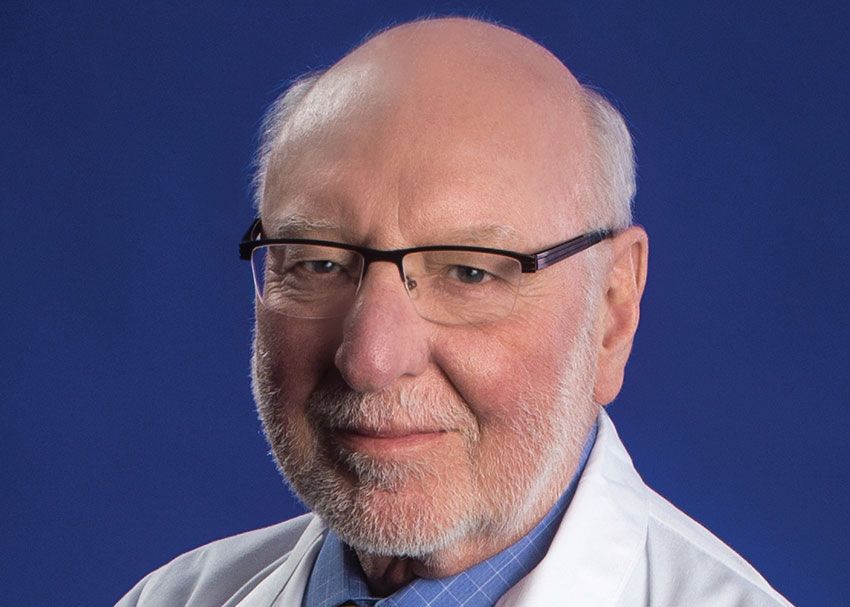
Around the world, researchers are working feverishly to discover effective treatments for COVID-19. One drug showing early promise is remdesivir, which is being studied at the University of Alabama at Birmingham (UAB) with the help of GW alumnus Richard Whitley, MD ’71, Distinguished Professor of Pediatrics; professor of microbiology, medicine and neurosurgery; vice chair of the Department of Pediatrics, and member of the O’Neal Comprehensive Cancer Center at UAB.
Remdesivr was originally developed to treat the coronavirus that causes MERS, or Middle East Respiratory Syndrome, and was being studied through a five-year, $37.5 million grant awarded to UAB’s Antiviral Drug Discovery and Development Center, or AD3C, from the National Institute of Allergy and Infectious Diseases Centers of Excellence for Translational Research (NIAID).
The drug has now proven effective in patients with COVID-19, and recently received approval for emergency use by the U.S. Food and Drug Administration.
Whitley, the primary investigator on the NIAID grant, in a recent interview spoke about the research into remdesivir, its use in patients infected with COVID-19, and the impact his work has had in drug development.
Can you talk about your role in the research around remdesivir?
Whitley: When I built the NIAID grant, I decided an important component would be to have a relationship with a pharmaceutical company that could help us develop the drugs that we discovered. I made Gilead Sciences our pharmaceutical colleague in a public-private partnership. At the time, they were screening for drugs to treat respiratory syncytial virus, and the drug that came up as active was remdesivir. They were screening the drug against many viruses as well, including Ebola and coronaviruses. … I suggested they give it to us so we could study it in our coronavirus project that was led by Mark Denison at Vanderbilt University and Ralph Baric at the University of North Carolina.
We were concerned about MERS and SARS [severe acute respiratory syndrome] and that they not only could come back, but be imported into the U.S. Even though SARS had gone away, MERS was still active in Saudi Arabia, and sooner or later we presumed it would get to the United States. So Gilead allowed is to study remdesivir … and AD3C provided data from the Denison and Baric laboratories to Gilead, and that led to clinical investigations.
Investigations continued with Ebola, and unsuccessfully at that, but then rapidly Gilead saw the drug had activity against SARS Co-V2 and research began to study its impact on COVID-19. The first study involved investigators all around the world who demonstrated that mortality, even with an open-labeled therapy study without a control population, was significantly decreased.
But then we needed a controlled study. One was done in China, but they didn’t accrue enough patients to determine whether the drug was truly effective or not … they were a couple hundred patients short of being able to draw clear conclusions. The second study was led by NIAID, which led to the emergency use authorization (EUA) and that is what changed the landscape in the management of these patients.
What did the results of the study show in the effect of remdesivir?
Whitley: The study found that remdesivir accelerated the time to resolution of clinical disease. So it decreased disease from 13 days to nine days. People might say, ‘well is that really important?’ But I think if you’re a physician, the answer is unequivocally ‘yes’ because it gets patients out of the hospital sooner. You may ask, did it decrease mortality? And the answer was no, but they also didn’t have enough patients to truly be able to answer that question. It would take close to 1,000 patients to answer whether mortality was effected. The primary end point was resolution of disease, and that end point was met. … That’s how we got to where we are with remdesivir.
How does the drug work?
Whitley: Remdesivir is an RdRp inhibitor, so what is that? An RNA-dependent, RNA polymerase inhibitor is a chain terminator that stops the replication of the viral genome, so the virus can’t make more virions or more progeny viruses. And if you can do that, hopefully you can blunt the inflammatory response as well.
Who will most benefit from taking the drug?
Whitley: It’s currently for people who have a significant oxygen requirement and are on ventilators; you’re going to see those patents get better faster. The longer you’re in the hospital and on a ventilator, the more likely you are to get a serious infection or die.
The government also has started a study where they are going to pair remdesivir with a drug that inhibits the inflammatory response, and that’s going to be controlled to see if they can modulate the inflammatory response in those patients. What I would like to see is the development of a drug that could be given to patients early on, those who are not yet in the hospital, that would be the real home run with bases loaded.
What does it mean for the drug to be authorized for emergency use by the FDA, and what comes next?
Whitley: The FDA doesn’t like using emergency authorization, but they do it if they have to. … Basically it means it’s OK to give the drug, but it’s not licensed and it still requires using it on an individual patient basis. What Gilead wants to do is provide enough data to the FDA for licensure.
There will be another analysis of the data late in May, and that analysis will include the data from the 1,150 patients enrolled in the NIAID Study. That will give further insight into what exactly the drug is doing and where the drug works. That can lead to answering questions of ‘can we use it earlier?’ ‘can it keep patients from going on ventilators?’ Then it’s going to be an issue of, ‘can we make enough drug to have it available for patients?’ And Gilead will have to address that issue.
What does it mean to you to have had a hand in the development of this treatment?
Whitley: I’m going to use a word I don’t often use and say that I feel blessed. I feel very fortunate. My academic career couldn’t be better and remdesivir is one piece of that. [My work] has had a significant impact on the development of many drugs, and all of those drugs have helped people in one way or another … but the most important now is remdesivir. Coming forward from this grant has meant more than anything. This is a team sport and I’m just one player. We’re all in this together.
Will you continue research efforts into additional treatments and therapies for COVID-19?
Whitley: Absolutely! One of the efforts we’re working on is medicinal chemistry support for all the other projects conducted through this NIAID grant. So that medicinal chemistry is developing new platforms of drugs that are going to be tested for activity against coronaviruses, and not only SARS Co-V2, but SARS and MERS as well.
You received your medical degree at GW, how have you used that education in your career?
Whitley: One of the most important things that GW provided me is the ability to become an excellent physician. It taught me to sort out the forest from the trees and understand the nature of illness and the ability to pose questions about people’s illnesses.
Being able to pose those questions has led to drug discoveries for diseases like neonatal herpes and encephalitis and shingles. … If you don’t learn to be a good physician, you’re just looking at the forest and you may miss that important leaf on a tree and that leaf may change the way you look at a disease, and that’s what’s been most important for me.


